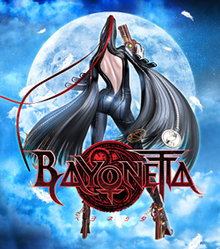| Bayonetta | |
|---|---|
 Cover art used in Japan for the original release and internationally for later releases | |
| Developer(s) | PlatinumGames[a] |
| Publisher(s) | |
| Director(s) | Hideki Kamiya |
| Producer(s) | Yusuke Hashimoto
|
| Designer(s) |
|
| Artist(s) | Mari Shimazaki |
| Writer(s) | Hideki Kamiya |
| Composer(s) | List of composers
|
| Series | Bayonetta |
| Platform(s) | |
| Release | October 29, 2009 |
| Genre(s) | Action-adventure, hack and slash |
| Mode(s) | Single-player |
Bayonetta[c] is a 2009 action-adventure hack and slash video game developed by PlatinumGames and published by Sega. It was released for PlayStation 3 and Xbox 360 in Japan in October 2009, and in North America and Europe in January 2010. It was released on Wii U in September 2014, Windows in April 2017, Nintendo Switch in February 2018, and PlayStation 4 and Xbox One in February 2020.[4]
Bayonetta takes place in Vigrid, a fictional city in Europe. The game stars the eponymous character, a witch who is capable of shapeshifting and using various firearms. She possesses magical attacks and she can use her hair to summon demons to dispatch her foes.
The game features a rating system, which gives players a grade based on their performance, and a combat system similar to the Devil May Cry series. Although unlike Devil May Cry, which features a live Style Rank to directly judge the player, Bayonetta (and subsequent Platinum action games) feature an arena based ranking system, which judges players based on variables such as time, combo size and damage at the end of each individual fight which then gets tallied up at the end of each chapter to determine the final rank.
Bayonetta was the third project released by PlatinumGames, which was founded by former Clover Studio employees. Development began in January 2007, with Hideki Kamiya as the director. The development team's name, "Team Little Angels," is a play on the name of the team who developed the first Devil May Cry game, "Team Little Devils." According to Kamiya, Bayonetta was completely original, though he drew some inspirations from Scandinavian mythology and played Devil May Cry 4 for reference. The game was designed to have a core theme of "sexiness" and to feature "fashionable" characters. To this end, Kamiya and artist Mari Shimazaki spent more than a year creating Bayonetta's design. Several demos were released prior to launch.
Bayonetta received critical acclaim upon its release. The game was praised for its combat, presentation, and soundtrack, but also drew some criticism for its story and quick time events. The game was nominated for and won several end-of-the-year accolades, had sold over one million units worldwide by 2010, and is considered to be one of the greatest video games ever made. An anime film adaptation by Gonzo, Bayonetta: Bloody Fate, was released in Japan in November 2013. The game was followed by Bayonetta 2 (2014), Bayonetta 3 (2022), and Bayonetta Origins: Cereza and the Lost Demon (2023).
- ^ "Bayonetta for Wii U - Nintendo @ E3". E3.nintendo.com. Archived from the original on July 14, 2014. Retrieved August 19, 2014.
- ^ Polygon (December 7, 2017). "Bayonetta 1 + 2 are heading to Nintendo Switch". Polygon. Archived from the original on December 8, 2017. Retrieved December 8, 2017.
- ^ "Nex Entertainment Contents" (in Japanese). Nex Entertainment. Archived from the original on March 20, 2016. Retrieved June 14, 2012.
- ^ Cite error: The named reference
IGN cites 10th anniversary releasewas invoked but never defined (see the help page).
Cite error: There are <ref group=lower-alpha> tags or {{efn}} templates on this page, but the references will not show without a {{reflist|group=lower-alpha}} template or {{notelist}} template (see the help page).